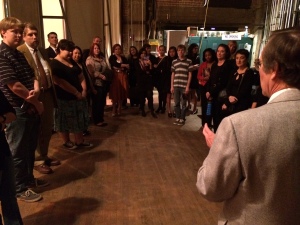
The Arts and Literature society was recently busy with the club’s annual involvement in Banned Books Week but last week students were presented with cultural offerings outside the normal realm of the society’s usual programming with a visit from a poet and a trip to the Wichita Falls Symphony Orchestra’s season-opening performance.
Tomi Elliot, English senior and Arts and Literature Society president, said she mostly traveled to art museums with the club, but society members and faculty advisers want to diversify the organization’s activities.
“It helps us be more interdisciplinary. It makes us open to a wider range of students. That’s why we can kind of touch on everyone’s interests and pull people in that way,” Elliot said. “It helps to broaden our views, even within the city’s scope. You definitely are able to introduce students to a lot more than what they normally would get.”
A way with words
Poet and Texas Tech University English professor John Poch came to Midwestern State University on Oct. 1 for a creative writing workshop and poetry reading, giving students a chance to hear Poch read his poems before working on their own.
“I really enjoyed it. I liked the way he made it kind of lighthearted and he talked about things that I can relate to like the small moments in life you take for granted,” said Faith Munoz, English freshman.
Poch entertained the nearly 80 students, faculty and community members in attendance, reading a mix of serious and humorous work, but Poch said his sense of humor doesn’t make his poems any less serious. Instead, he said it makes his work more human.
“A huge part of who we are is also the comical aspect of who we are. I think we can’t think of poetry as only the most serious of emotions. That’s a big mistake,” Poch said. “I want to be fully human standing up there in front of people. I do know that at readings I’ll tend to read more humorous poems because people want to laugh. People want a range of emotions so I’ll tend to do that. It’s also nice to go from something very serious to something light and then back.”
Poch, who once studied to become an engineer, said there is creative value in earning a broad education across disciplines.
“There are a lot of really boring poets where all they know is literature and they don’t know about other stuff in the world and it makes for pretty boring poetry. I also think there are a lot of boring engineers who don’t know any poetry and it would benefit them to get some poetry, or more creativity, into their lives,” Poch said. “Obviously as an engineer, it doesn’t mean you’re not creative. The best engineers are extremely creative, and that goes for any discipline.”
Munoz said she was glad the Arts and Literature Society brought Poch to the school because it was an opportunity she didn’t have before.
“I never had this sort of thing at my school because I went to an online school, so those kinds of things are limited,” Munoz said. “I like that there are a lot of different events because it’s not just about literature, it’s also about art. I might be interested in a little bit of the arts, and it’s interesting to be able to get around people that enjoy the same kind of things.”
A little night music
About 15 student and faculty members of the Arts and Literature society went to the Wichita Falls Symphony Orchestra’s Oct. 4 performance featuring violinist Jennifer Koh. Assistant Professor of English and society adviser Todd Giles said he was able to get free tickets for students and he also arranged a backstage Q-and-A with some of the musicians.
“It was a wonderful opportunity for MSU students to experience the Wichita Falls Symphony Orchestra—many for the first time—in a friendly, relaxed atmosphere,” Giles said. “It was a real thrill for us to go back stage immediately after the concert to meet Dr. Shaffer, Professor Koh the amazing guest violinist, and several of the principal performers, including the Concertmaster, Professor Kristin Van Cleve. Not only did we get to meet some of the many wonderful performers and ask them questions, we also got to check out what goes on backstage after a performance.”
Radiology sophomore Demetria Samuel said it was her first time attending a classical music concert.
“I was expecting more short pieces instead of four long ones. I wasn’t used to that. Like in choir, they would just sing a song and then they’re done. I enjoyed it though, like all the pieces tied into each other,” Samuel said. “I wasn’t expecting the violinist to be so theatrical. That’s one of the things that drew me in. I was like, ‘Wow, she’s so into it,’ and that made me more interested in her performance. I enjoyed how it was theatrical, but it was real. She wasn’t faking or putting on a show, that was just her passion for music.”
Samuel said she likes gaining the behind-the-scenes knowledge of how just about anything works, so the backstage talk was eye—and ear—opening for her.
“I enjoyed meeting the lead musicians, otherwise I wouldn’t know who they are. I just wonder how experienced they were, how many years they’ve worked here, things like that. It just makes me want to know if they’ve been doing this their whole life,” Samuel said. “I just wish I was more musically knowledgeable. I like different types of music and things like that, but I don’t know a lot of what goes into making it, so coming to a thing like this is more of an eye-opener. You can see all of the different parts that make the whole, so I was listening to different pieces trying to find who was making which sound.”
















